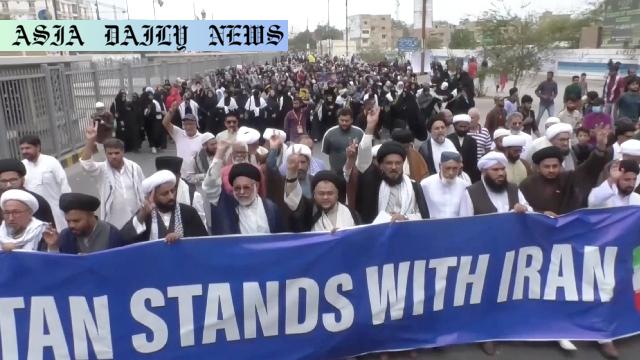US strikes on Iran: Pakistan and Taliban criticize U.S. airstrikes, denouncing it as a violation of sovereignty and rights.
- Pakistan condemned US airstrikes on Iran’s nuclear facilities.
- The Taliban also denounced the strikes, emphasizing sovereignty.
- Protests erupted in Karachi and Islamabad against the strikes.

Introduction: US Strikes on Iran and Global Reactions
In a surprising escalation in the Middle East, the United States conducted airstrikes on Iranian nuclear facilities, a move that has prompted international outrage and widespread condemnation. Among the nations voicing their dissent are Pakistan and Afghanistan’s Taliban interim government, both of which have issued strong statements denouncing the U.S. attacks. The events have reignited debates over sovereignty, civilian safety, and the already fragile geopolitical balance in the region.
The strikes, while portrayed by the U.S. as a preventative measure to curb potential nuclear threats, have sparked protests in Pakistan’s largest city, Karachi, as well as in its capital, Islamabad. Thousands of demonstrators openly criticized both the actions of the U.S. and what they perceive as ongoing Israeli aggression in the Middle East. Pakistan’s foreign ministry highlighted an urgent need for the de-escalation of conflict and emphasized the importance of protecting civilian lives.
Pakistan’s Response: A Shift in Narrative
Pakistan’s reaction has been particularly noteworthy due to its striking contrast in tone. Mere days ago, Islamabad floated the idea of nominating former U.S. President Donald Trump for a Nobel Peace Prize for his role in ending a four-day conflict between Pakistan and India. However, the government has now taken an oppositional stance, firmly criticizing the U.S. for its strikes on Iran and calling for an immediate end to violence.
This shift highlights Pakistan’s delicate position in the geopolitical landscape, where maintaining alliances and addressing domestic concerns requires careful balancing. The protests witnessed in Karachi and Islamabad underscore public sentiment, reflecting broader dissatisfaction with international interventions perceived as aggression against Muslim-majority nations.
The Taliban’s Stand on Iranian Sovereignty
Reiterating their position as a significant player in the region, Afghanistan’s Taliban interim government also condemned the U.S. airstrikes. Their statement described the attacks as a violation of Iran’s sovereignty and territorial integrity. This condemnation comes as the Taliban continues to seek legitimacy on the global stage, emphasizing their commitment to regional stability and full sovereignty for neighboring nations.
The Taliban’s condemnation aligns with their broader geopolitical strategy, establishing them as a voice for preserving the rights of Muslim-majority nations while opposing foreign interventions. They have called for peaceful resolutions to conflicts in the region, reiterating their stance against violations of sovereignty.
Protests Erupt in Pakistan
Public response in Pakistan has been immediate and vocal. The airstrikes have stirred emotions, bringing thousands of citizens to the streets in Karachi and Islamabad. Protesters carried banners denouncing U.S. aggression and chanted slogans critical of both the U.S. and Israel. The demonstrations highlight how deeply the issue resonates in Pakistan, a nation with strong cultural and historical ties to the broader Muslim world.
While protests in South Asia are not rare, the sizable turnout in major cities shows growing apprehension about escalating tensions in the Middle East. Pakistanis expressed solidarity with Iran and called for an end to foreign military interventions in their neighboring regions.
Conclusion: The Need for De-escalation
The recent U.S. strikes on Iran have led to a geopolitical ripple effect, drawing strong reactions from Pakistan, the Taliban, and protesters on the ground. This series of events highlights the interconnectedness of global politics and the importance of diplomatic approaches to resolve conflicts.
As the situation unfolds, the international community will closely monitor developments, with hopes of de-escalating tensions and preventing further violence. The calls for peace, reinforced by Pakistan and the Taliban’s statements, serve as a reminder that military actions often have far-reaching consequences, affecting not only immediate targets but also broader regional stability.



Commentary
Contextualizing the US Strikes on Iran
The recent U.S. airstrikes on Iranian nuclear facilities have once again brought the precarious nature of Middle Eastern geopolitics to the forefront. While the United States cited security concerns as justification for the strikes, this decision has drawn sharp criticism from both regional players and the broader global community. In particular, Pakistan and Afghanistan’s Taliban interim government have made headlines with their unified condemnation of the attack.
Pakistan’s Complex Role in Global Dynamics
Pakistan’s reaction encapsulates the challenges of navigating a complex network of alliances and international relationships. As a key ally to both the United States and regional neighbors like Iran, Islamabad finds itself in a delicate position. Its recent decision to condemn the strikes stems not only from solidarity with Iran but also from domestic pressures, where public sentiment often leans towards opposing foreign interventions in the Middle East.
The protests in Karachi and Islamabad amplify this sentiment, showing Pakistan’s sensitivity to actions perceived as targeting fellow Muslim-majority nations. However, it also underscores how quickly narratives can shift in international politics, as Pakistan had recently signaled a more collaborative stance with the U.S. by suggesting Trump for a Nobel Peace Prize.
The Taliban’s Pursuit of Legitimacy
The Taliban’s condemnation of the strikes represents a calculated move to position themselves as a legitimate geopolitical entity. By aligning with Iran on the issue of sovereignty, the Taliban not only reinforces its ideological stance against foreign military interventions but also aims to foster regional cooperation. This is part of a broader strategy to gain international recognition and support.
Final Thoughts
What remains evident is the need for broader dialogue and diplomacy. As tensions rise owing to such military actions, the international community must prioritize peace-building efforts. Both Pakistan and the Taliban have highlighted the importance of these measures, emphasizing the need for sovereignty and the protection of civilian lives. The unfolding narrative serves as a stark reminder of the delicate balance of power in global politics and the far-reaching implications of every decision made within it.